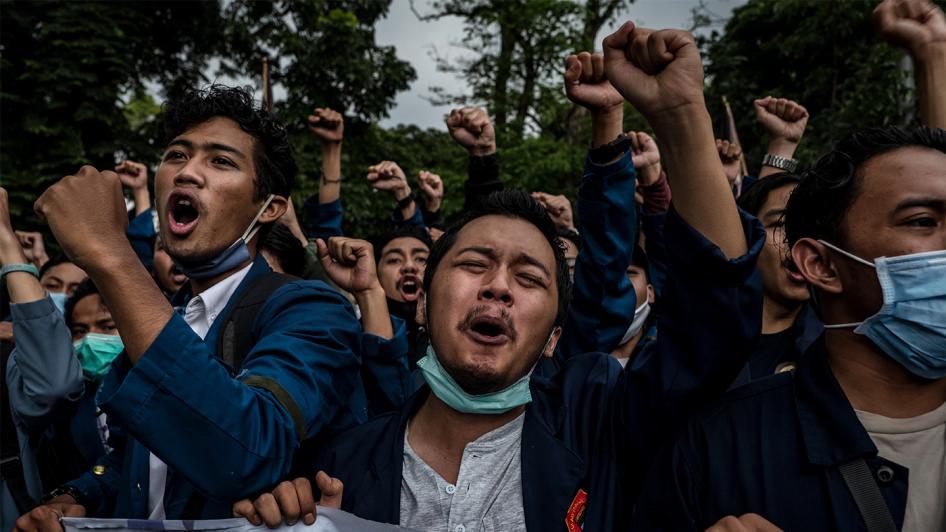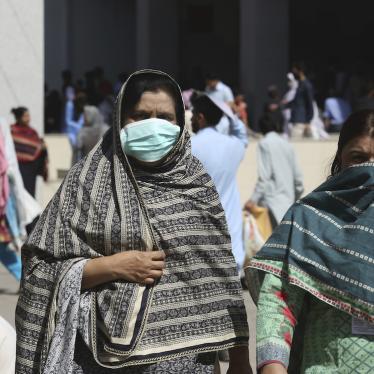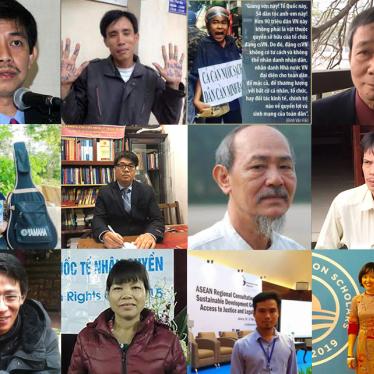(Jakarta) – The Indonesian government responded slowly and insufficiently to the Covid-19 pandemic in 2020, focusing instead on a jobs law that will harm labor rights and the environment, Human Rights Watch said today in its World Report 2021.
The response of President Joko “Jokowi” Widodo’s government to the Covid-19 pandemic was weak, with low testing and tracing rates, and little transparency. The impact of the virus has been devastating, killing at least 17,000 people, and leading to the loss of 2.6 million jobs. Epidemiologists estimate that the number of deaths could be three times the official tally. While the country was facing huge coronavirus outbreaks, Jokowi and his governing coalition on October 5 hastily passed an omnibus law on job creation that restricts labor rights and dismantles environmental protections.
“The Jokowi government never seemed to make the pandemic its top priority, focusing instead on passing a business-friendly law that harms workers and the environment,” said Brad Adams, Asia director at Human Rights Watch. “Creating jobs and planning economic recovery are important goals especially in a pandemic, but they should not come at the expense of fighting the virus or protecting the hard-fought rights of workers.”
In the 761-page World Report 2021, its 31st edition, Human Rights Watch reviews human rights practices in more than 100 countries. In his introductory essay, Executive Director Kenneth Roth argues that the incoming United States administration should embed respect for human rights in its domestic and foreign policy in a way that is more likely to survive future US administrations that might be less committed to human rights. Roth emphasizes that even as the Trump administration mostly abandoned the protection of human rights, other governments stepped forward to champion rights. The Biden administration should seek to join, not supplant, this new collective effort.
The roughly 1,000-page omnibus law was largely drafted by the business community, with little consultation from labor unions and other affected groups. It significantly reduces minimum wages, severance pay, vacation, maternity benefits, and health and childcare benefits. It weakens existing environmental laws and legal protections for Indigenous groups, raising concerns about land grabbing.
The rights of religious minorities, women and girls, and lesbian, gay, bisexual, and transgender communities continued to come under attack in many parts of Indonesia. Islamists targeted minorities with threats and intimidation with little government response. Indonesian police arrested at least 38 people for blasphemy across 16 provinces in 2020. The Supreme Court also rejected a public petition to revoke the so-called “religious harmony regulation,” which has been used to close thousands of houses of worship, mostly Christian churches, since 2006.
Indonesia also continued to limit access for international rights monitors and journalists to visit Papua and West Papua provinces, which have long been affected by unrest and rights violations.
“Jokowi came to office promising progressive reforms, but in 2020 he seemed to give up any remaining intentions he had to protect rights and the most vulnerable,” Adams said. “It’s not too late for him to take bold steps to prioritize public health, reinstate labor and environmental protections, and protect free expression. His last years in office will define his legacy.”
Indonesia: Weak Public Health Response to Covid-19
Greater Efforts Spent on Law Undermining Labor, Environmental Rights
Your tax deductible gift can help stop human rights violations and save lives around the world.
Most Viewed
-
November 25, 2019
A Dirty Investment

-
June 24, 2022
Q&A: Access to Abortion is a Human Right

-

-
April 22, 2024
Iran: Security Forces Rape, Torture, Detainees

-
June 21, 2017
“Just Let Us Be”




